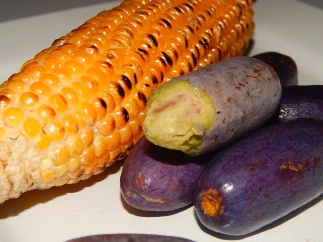Pregnancy is a crucial phase in a woman's life, because everything you do or take is believed to have an impact on the little one you carry. Nutrition is very important during pregnancy. Ube, also known as African bush pear, is one such food that has received some attention because of its potential advantages during pregnancy.
In this blog post, we will discuss what ube is, its nutritional contents, whether or not it’s safe for you and your baby as well as the benefits it brings when consumed during pregnancy.
What is ube?
Ube which is also referred to as African bush pear grows on trees called Uvaria Chamaeplanthes found mainly in tropical parts of Africa. The fruit has a hard shell that cannot be eaten but inside there are soft pulps that are edible. It has a sweet taste and creamy texture which makes it an ideal component for many dishes and desserts.
Nutritional components of ube
Ube is an energy-rich food that provides many vital nutrients for expectant mothers like:
- Fiber: Ube provides dietary fiber, which serves to relieve common problems of pregnancy such as constipation and haemorrhoids.
- Vitamin C: Ube has vitamin C necessary for collagen production — a protein that supports body tissue growth and repair.
- Minerals: Ube contains essential minerals like potassium, magnesium, and calcium needed to keep healthy levels of blood pressure, muscle activity as well as bone development among others.
- Carbohydrates: Being full of complex carbs, this tuber offers sustained-release carbohydrates that cater to the increased energy needs during pregnancy.
Is it safe for pregnant women?
When cooked and prepared well, Ube is generally safe for a pregnant woman to eat. Studies have shown that it is important for the health of the baby when a mother eats a balanced diet full of nutrients throughout pregnancy. These nutrients are not only good for the growing child but also the health of the mother.
One research discovered that antioxidants abundant in ube help protect against oxidative damages thereby ensuring overall well-being. Nevertheless, as a pregnant woman, you should watch out for any allergic reactions you might have when you consume meals with ube.
Health benefits in pregnancy
- Regulation of blood sugar: Ube’s low glycemic index assists in regulating sugar levels which are useful for treating gestational diabetes.
- Healthy digestion: In promoting gut health throughout pregnancy, ube has fibers that can aid digestion and prevent constipation as well.
- Growth of the fetus: It is very important to support good growth and development during pregnancy so various nutrients found in vitamin C such as potassium, and magnesium among others should be consumed through ube tuber vegetables.
- Increase in energy: The complex types of carbohydrates present within this tuberous crop help fight off tiredness while also providing necessary strength for staying healthy always when expectant.
- Boosting the immune system: Protection against infections or diseases can be achieved by boosting our immune systems – which is why we need all those vitamins & minerals contained within this root crop called ube. This will ensure that both mother and child stay safe from any illness-causing organisms.
Ube is both healthy and tasty greatly benefiting expectant mothers. Thus adding Ube into prenatal meals helps nourish the body better when pregnant.
Frequently Asked Questions (FAQs)
- Is ube safe for pregnant women?
African bush pears, which are also known as ube, can generally be consumed safely when cooked and prepared well during pregnancy. However, expectant mothers should stay away from any allergic reaction or sensitivity they may have towards this fruit or other ingredients found in meals that contain it.
- Are there side effects of eating ube in pregnancy?
There have been no reported cases of anyone experiencing negative impacts after consuming moderate amounts of African bush pear throughout gestation within a balanced meal plan. Nevertheless, individuals must cook the fruit properly hence minimizing the chances of any risks occurring.
- How to eat ube
Various methods can be used to serve ube such as; eating it raw, roasting it over firewood or even baking desserts like pies etcetera using them.
Why journey alone in your pregnancy? Join over 300,000 moms in PreggClass. For medically verified information, 24/7 medical check-ups, live classes, practical sessions, and more! PreggClass goes for N10,000 per slot! Want to know more about PreggClass? Let's chat!










Comments